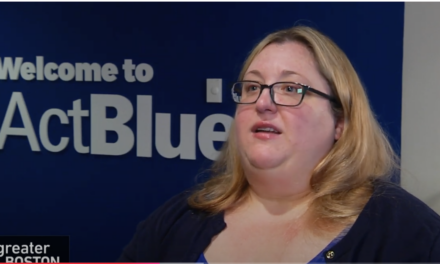We support our Publishers and Content Creators. You can view this story on their website by CLICKING HERE.
People stood in line for hours on Friday at Bucks County, Pennsylvania, election offices waiting for their chance to participate in the election. Some were outraged that the line was so slow and the county did not have more election workers on hand.
“They opened at 8:00,” Pat Poprik, chair of the Bucks County Republican Committee told The Federalist. “People were there at 8:30 and by 12:30 they had not voted. … The average wait was like four or five hours.”
Some social media posts claimed the long lines were purposeful and were evidence of the county attempting to suppress voters, but Poprik does not think so.
“I don’t think it’s voter suppression. I think it was inconvenient. They were not disenfranchised. They were still able to vote, albeit inconvenient and a long time, but they weren’t not allowed. It wasn’t like Tuesday when they put that placard down and said you can’t vote. That was disenfranchisement, and that’s what the judge addressed, and rightly so.”
The Republican National Committee and the Trump campaign went to the Bucks County Court of Common Pleas this week, complaining the county’s action of turning voters away before the 5:00 p.m. deadline on Tuesday violated the election code.
The deadline to apply for a mail-in ballot in Pennsylvania was Tuesday, Oct. 29 at 5:00 p.m., but so many people applied for a mail-in ballot in the days before the deadline — and in many cases, then filled out the ballot on the spot and turned it back into the election worker by hand — that long lines formed.
It was averaging 12 minutes to process each ballot request, Bucks County Spokesman James T. O’Malley previously told The Federalist. County workers estimated how many people they could serve by the 5:00 p.m. deadline Tuesday, then cut off the line before 3:00 p.m., saying anyone after a certain point in the line would not be able to hand in their completed ballot at the desk that day. Anyone still in line could get a mail-in ballot that would be prepared the next day and be available for pickup.
“The judge felt the way most of us felt,” Poprik said. “Putting that sign down, telling people they couldn’t go in when their website said 10:00 to 5:00.”
The judge extended the deadline to Friday, Nov. 1, at 5:00 p.m., and on Friday night, the last members of the public were still being served by election workers near 8:00 p.m., when Poprik left.
This logjam happened because Pennsylvania does not technically have “early voting,” just something that looks a lot like it.
Not Election Day, Not a Polling Place
To understand what has caused these long lines, you need to know that Pennsylvania has “in-person” voting on Election Day and, new as of 2020, “mail-in” voting.
A mail-in ballot can (obviously) be sent back to the election office through the U.S. Postal Service, it can also be dropped off in a secure drop box, or it can be handed in at the counter of an election office until 8 p.m. on Election Day.
To vote by mail, you must request a mail-in ballot. The ballot can be mailed to you, or it can be applied for and picked up in person.
Some voters fill out the ballot on the spot and hand it back to the election worker. This has become known as “on-demand mail-in voting.” It’s a nutty name, because in this case, the mail-in ballot never touches the mail.
This is what the people in line mean when they say they have come to vote. They are really there to request a mail-in ballot. It is a different function and slower function than voting in person on Election Day.
To prevent fraud (for example, an individual ‘voting early’ using on-demand mail-in voting and voting on Election Day), election workers must handle extra paperwork with each on-demand mail-in vote.
The election worker must look the voter up in the state computer system and ensure that he is eligible to vote, identify what precinct he should vote in, print an individual ballot specific to his precinct, and mark the individual in the state computer system as having requested a mail-in ballot before handing the voter a ballot and two envelopes.
Election Day is different because the poll book is prepared by then. Voters go to their own precincts, where their names appear in the poll book. Ballots are already printed, extra workers and poll watchers are on hand, and multiple voting booths are set up to serve more people at once.
Pennsylvania Republicans have gotten skunked in recent elections because Democrats embraced mail-in voting and Republicans have been mistrustful of it. In 2020, Trump was urging people to vote in person.
When the 2022 midterm election results came in, Republicans were leading or close in many races when in-person votes were counted. But as mail-in votes were counted, the lead evaporated and Democrats won many races.
Republicans at every level recognized the strategy and pushed hard for mail-in participation in 2024. They targeted the low-propensity Republican voters who may be unwilling to stand in line on Election Day and encouraged everyone to vote early — in Pennsylvania that means requesting a mail-in ballot.
Poprik said it seemed to be mostly Trump supporters in line Friday, although there were some Harris supporters. She said the state legislature should address the issues caused by mail-in voting and make sure there is a uniform process in counties across the state.
And she put in a good word for the election workers who put in long hours Friday.
“The workers were wonderful. The fault lies at the top, with the board of elections — the commissioners. They did not have enough people. I guess they underestimated how many people would take advantage of this.”
Beth Brelje is an elections correspondent for The Federalist. She is an award-winning investigative journalist with decades of media experience.

 Conservative
Conservative  Search
Search Trending
Trending Current News
Current News 





